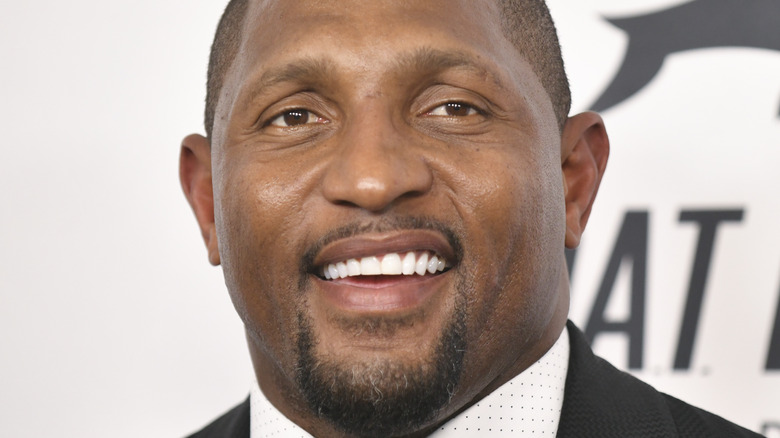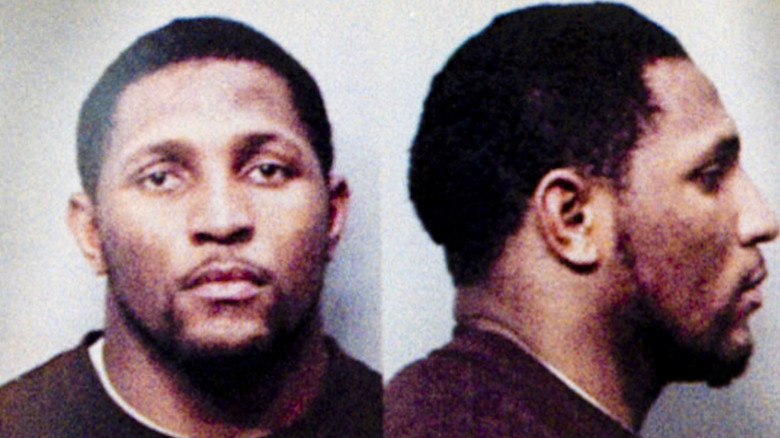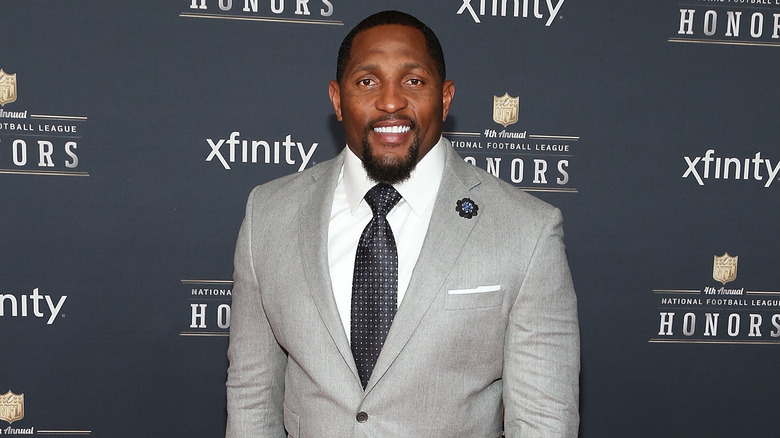The Murder Case That Ray Lewis Can't Shake From His Past
Ray Lewis was an undeniable force on the football field, but his career was shrouded in controversy. After he was drafted by the Baltimore Ravens in 1996, Lewis played all of his 17 seasons with the team before retiring in 2013. He made 13 Pro Bowls, was the NFL defensive player of the year two times, and won two Super Bowls with the Ravens over the course of his career.
In 2018, Lewis was inducted into the Football Hall of Fame — and during his speech, the linebacker discussed the impact his career had on the team's city. "When I played, crime went lower in Baltimore," Lewis tweeted. "It's like, nobody needs to be mad now. It's like everybody wants to be happy and celebrate," he added. Nearly two decades before giving his speech, Lewis was charged with a crime that did not give people reason to celebrate.
In January 2000, Lewis was implicated in the murder of two men. The Ravens star player had attended a Super Bowl party in Atlanta. At around 4 a.m. on Jan. 31, a brawl broke out where the victims — Jacinth Baker and Richard Lollar — were stabbed multiple times with fatal wounds after an altercation with Lewis' friends, per NPR. Lewis fled the scene in his limo, where blood of the victims was later discovered. "I'm not trying to end my career like this," a witness claimed Lewis told friends later that night, per USA Today. This led to Lewis pleading guilty to a crime.
What crime did Ray Lewis plead guilty to?
Originally, Ray Lewis was charged with murder in 2000, but he quickly had those charges reduced. The Baltimore Ravens player pled guilty to obstruction of justice and agreed to testify against his two friends, Reginald Oakley and Joseph Sweeting, who were also charged with the murders, per ABC News.
The two other defendants stood trial for the murders of Jacinth Baker and Richard Lollar stemming from the Super Bowl party brawl. Eventually, Oakley and Sweeting were both acquitted of the murder charges. Nobody else confessed to the stabbings, and the case was left unsolved. "My nephew was brutally beaten and murdered, and nobody is paying for it," a member of one of victim's [Baker] family members told USA Today in 2013 while reflecting on the trial. Although Lewis avoided the murder charges, the NFL levied a $250,000 fine against the linebacker for failing to cooperate fully with authorities. "In doing so, he put his own livelihood and reputation needlessly at risk, and he caused great harm to other NFL players and to the league," the league's then-commissioner, Paul Tagliabue, said in 2000, per ABC News.
That was far from the end of the ordeal for Lewis, as questions remained about his involvement in the attacks. Baker's family filed a wrongful death suit against Lewis in 2003, and Smith's family filed their own lawsuit in 2004. Both families were awarded undisclosed amounts from the NFL star, per CBS Sports. The most pressing question was what happened to the clothes Lewis wore that night.
Ray Lewis' missing suit is a lingering question mark
One key piece of evidence was missing and never recovered from the murder trial: the cream-colored suit that Ray Lewis wore the night of the infamous Super Bowl party. "Where's that white suit that was all bloody?" stabbing victim Richard Lollar's brother, Handsome Lollar, asked USA Today in 2019. The family of the other victim, Jacinth Baker, had similar questions. "Why would that or anything else they had on them end up missing that night unless it was something that linked them to the murder?" Baker's uncle, Greg Wilson, said to USA Today. The missing suit was a key part of the civil lawsuits filed against Lewis years earlier.
According to Lewis, he was unfairly targeted as a suspect in the murders. In 2015, the former Baltimore Raven spoke about the stigma surrounding him and the trial. "But nobody ever want to say that from day one, there was not one inch of evidence on me," Lewis told NPR in 2015. A few years later, Lewis was set to be inducted into the Hall of Fame in 2018 when Baker and Lollar's families were interviewed about the retired player's involvement in the murders. Robert Klemko of Sports Illustrated approached Lewis for comment, but the Hall of Famer refused to discuss the case. "Respectfully, this is my space. You need to go find your space right now," Lewis told Klemko, making it clear that despite the looming intrigue, the NFL vet was through discussing the murder charges.



